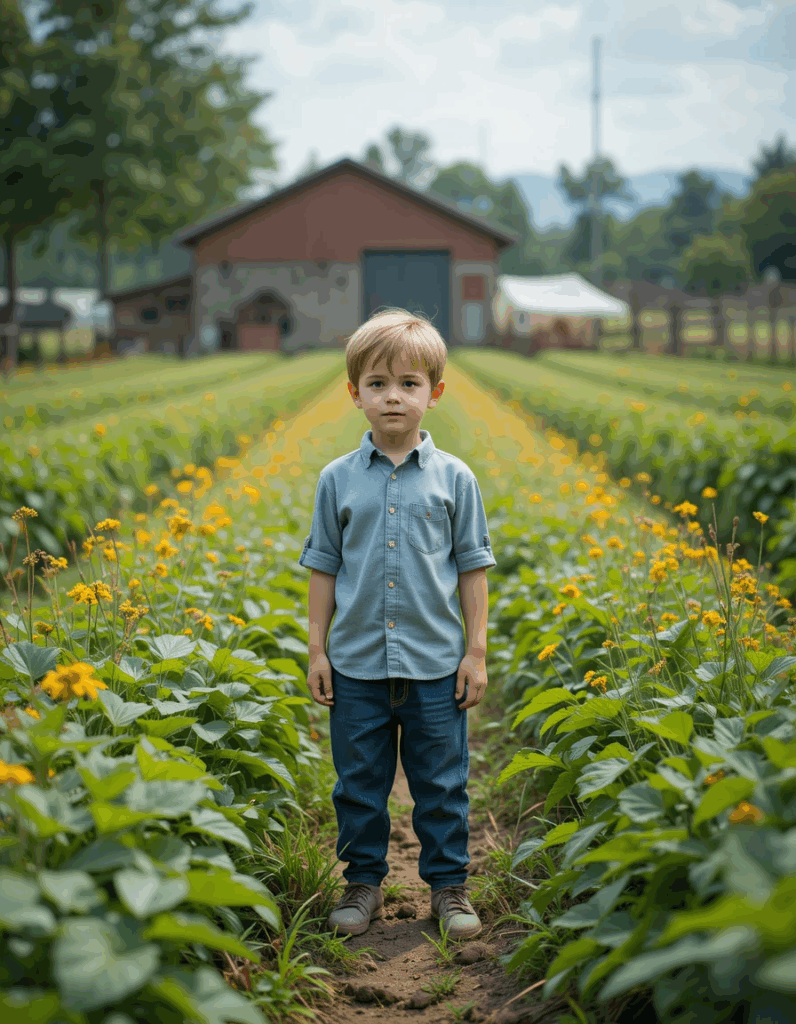I Brought My Nephew To The Farm To Teach Him A Lesson But He Ended Up Teaching Me One
My sister pleaded with me to look after her boy while she was out of town for work. “It’s only a few days,” she assured me. “Take him to the farm. Let him see something real.”
So I picked up Reuben — eleven years old, fair as snow, hair like spun gold — and drove him to my place tucked away in the valley. No Wi-Fi. No gadgets. Just goats, hens, and the kind of quiet that feels almost eerie if you’re used to the city.
He didn’t grumble, but his big eyes were round with that stunned look of someone who’d just been plopped into a world that smelled mostly like hay and animals.
Day one, I had him shoveling out the stalls. On day two, we fixed up a busted fence. “This is good for you,” I kept repeating. “Builds character.” He gave me small nods, his tiny boots slogging through the mud as he struggled to keep up.
But on the third morning, something changed.

I found him kneeling outside the chicken pen, murmuring to one of the hens like they were old pals. When I asked him what he was up to, he answered, “She’s the only one who doesn’t get mad if I do something wrong.”
That one hit me like a brick.
That afternoon, I caught him near the barn, coaxing the runt of the goat pen to eat. He’d named her Marshmallow. “She looks lonelier than me,” he said quietly.
“Why do you feel lonely, buddy?” I asked him.
He glanced up at me, eyes shining with a sadness too big for someone his age. But he didn’t say anything. And I didn’t push. I just sat there in the stillness.
That night, after I tucked him into bed, I picked up the phone and had a long-overdue talk with my sister.
The next morning, when I went into the old shed, I noticed a plank of wood nailed above the doorframe. Scrawled in his uneven writing were the words:
“THIS IS WHERE I MATTER.”
And that broke me — not because it was loud or angry, but because it was so quiet, so small, and so real. It was like he’d been carrying this burden forever and had finally found a place where someone would see him.
After breakfast, I sat him on the porch with a warm mug of cocoa. “Hey,” I asked, “what’s going on at home?”
He hesitated, then spoke, his voice so small I could barely catch it. “Mom’s always tired. Or she’s mad. And even if I don’t do anything wrong, I still feel like I’m just… in the way.”
That hit me straight in the chest.
I don’t have kids myself, but I know that feeling — trying to take up less space so nobody notices you. Growing up, my own dad wasn’t one for gentle words. You worked hard, you kept your mouth shut, and you didn’t ask for much. Maybe that’s why I thought dragging Reuben out here and putting him to work was what he needed. Maybe I thought the farm would “toughen him up,” when really he just needed someone to listen.
So I shifted gears.
We still did chores, sure, but I let him take the lead. I asked his thoughts on fixing the chicken ramp. I told him to name every goat we had. Together we built a little wooden sign for Marshmallow’s stall that read: “GOAT HQ.”
And his questions kept coming too. “Do goats ever get scared?” “Why do chickens sleep with one eye open?” “Why do you live out here all by yourself?”
That last one hit me especially hard.
I told him the truth — that I’d gotten so used to keeping my distance, I hadn’t noticed how lonesome it could feel. Being quiet and being at peace weren’t necessarily the same thing.
When his mom finally pulled into the driveway a few days later, Reuben was in the truck bed, petting Marshmallow and looking out over the pasture.
“I wish I could stay,” he whispered.
“You don’t have to figure everything out right away,” I told him. “But remember this: you’re never extra, Reuben. To me, to your mom, even to that silly goat — you matter.”
When my sister stepped out of the car, she looked worn-out but lighter somehow. And when she saw her boy, really saw him, something in her expression softened.
I pulled her aside. “I’m not telling you what to do,” I said gently. “But that kid? He’s special. He just needs to know someone’s paying attention.”
Her eyes brimmed with tears. “I didn’t realize how much I was missing,” she whispered.
That’s when we decided. Reuben would come up one weekend a month — more often if he wanted. And we’d all do better at checking in. Before they left, I handed him his very own little toolbox. “You’re my Junior Farmhand,” I told him. “Badge included.”
That sign he painted? It still hangs in my shed. “THIS IS WHERE I MATTER.” Every morning when I see it, I remind myself: nobody needs fixing as much as they need to be heard.
And sometimes, the smallest hearts have the most to teach us.
If this story spoke to you, pass it on. Someone out there may need to hear this today.


